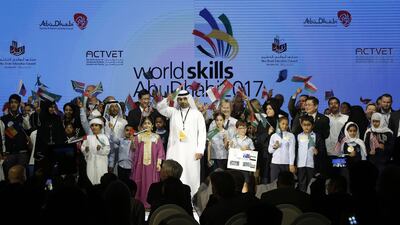ABU DHABI // A cultural exchange programme that will connect Abu Dhabi school pupils with students from dozens of countries was announced on Monday.
The One School One Country programme will take place as part of the WorldSkills Abu Dhabi competition in October. About 1,300 participants from 76 countries are expected to take part in the vocational and technical skills event – the first of its kind in the region.
Children from 59 Abu Dhabi schools will be paired with international teams competing in WorldSkills, which is held every two years in different host cities.
Nine-year-old Emirati Salama Anwar, a pupil at Abu Dhabi’s Al Muzdalifa School, was looking forward to learning about Vietnam, her school’s country.
“I know it’s a country in Asia and has nice crops grown there. It’s a beautiful place and has wonderful climate,” the Grade 4 pupil said.
“This event will give me a chance to know about other cultures. I have never been to Vietnam but I learnt about it from our school.”
Mubarak Al Shamsi, director general of the Abu Dhabi Centre for Technical and Vocational Education and Training (Actvet), said the competition is a celebration of youth and for youth.
“The bonds of friendship we witness for the first time will grow in the coming months as the school students and teams learn more about each other,” Mr Al Shamsi said.
Grade 4 pupil Sawsan Al Hina, from Al Rahba School in Abu Dhabi, said her school is paired with The Netherlands.
“I am happy that it happens here in our city. It will teach us about another country, people and their culture,” she said.
Simon Bartley, the president of WorldSkills, who attended the programme’s launch in Abu Dhabi, said it will help ensure the pupils’ future.
“By the very act of partnering with competitors from WorldSkills members, they will create an understanding which will help create a peaceful future, a peaceful future for them and their children, and their children’s children,” he said.
WorldSkills will be open to the public, free of charge, at Abu Dhabi National Exhibition Centre from October 15 to 18. About 100,000 people are expected to visit the event, organised by EmiratesSkills, a subsidiary of Actvet.
“This is the first time we are hosting it here in Abu Dhabi, as we became a member of it in 1999,” said Ali Al Marzouqi, president of EmiratesSkills. “We hope that the UAE will win some medals in this world championship of skills.”
Participants will compete in 51 categories, which include aircraft engineering, mobile robotics, cooking, floristry and 3-D digital design. The 34 members of the UAE team will compete in 30 of the categories.
Gold medal winners will receive Dh300,000, silver Dh200,000 and bronze Dh100,000. Medallions of excellence will also be awarded, with prizes of Dh50,000.
anwar@thenational.ae

